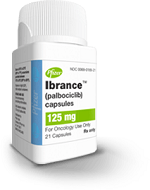Pfizer's ($PFE) Ibrance has been steamrolling since it nabbed an early FDA go-ahead last February. And even with competition coming up the pipeline from the company's Big Pharma rivals, Pfizer intends to keep it that way.
 Last week on the drugmaker's Q4 earnings call, Albert Bourla--the company's head of its vaccines, oncology and consumer health unit--defended the soon-to-be blockbuster to analysts eager for answers about how intends to fend off forthcoming competition. Ibrance is already registered in the U.S. and 6 other countries--with approval coming as soon as this year in Europe. And across those locales, it's so far been prescribed by 5,000 docs to more than 20,000 patients.
Last week on the drugmaker's Q4 earnings call, Albert Bourla--the company's head of its vaccines, oncology and consumer health unit--defended the soon-to-be blockbuster to analysts eager for answers about how intends to fend off forthcoming competition. Ibrance is already registered in the U.S. and 6 other countries--with approval coming as soon as this year in Europe. And across those locales, it's so far been prescribed by 5,000 docs to more than 20,000 patients.
But Pfizer isn't stopping there. The company has a "very heavy" clinical program, as Bourla put it, with two studies happening in first-line metastatic breast cancer, two in recurrent forms of the disease, and three in early breast cancer, he pointed out. Overall, the drug is part of 88 ongoing investigational trials--38 of which are in tumor types other than breast cancer.
"As you can see, we are investing heavily to stay ahead of the competition," he said.
That competition could come from Novartis ($NVS), whose Phase III ribociclib would join Ibrance in its class. The Swiss drugmaker fast-tracked its candidate when Pfizer published convincing, early efficacy data on Ibrance, Bernstein analyst Tim Anderson wrote in a Monday note to clients. Considering the $723 million Ibrance has racked up in less than a year on the market--and the success it's had pressuring "established" breast cancer meds like Novartis' Afinitor--it "isn't a surprise" that Ibrance could "face competition fairly soon," he wrote.
Novartis' contender isn't the only potential Ibrance nemesis working its way through the clinic, either. Analysts pressed Pfizer execs last week about Eli Lilly's ($LLY) abemaciclib, whose Phase II data is due to read out midway through this year.
The way Pfizer R&D Chief Mikael Dolsten sees it, however, that treatment has a different clinical profile from Ibrance and Novartis' therapy--as well as some "significant" GI side effects. "We … have been extremely pleased with the favorable profile that allows patients to benefits from Ibrance with very good reliability," he noted.
As Anderson pointed out, though, Lilly has already claimed a couple of positive differentiation points for the prospect--including lower toxicity levels that allow for continuous daily dosing. "If abemaciclib is shown to have a better clinical profile, then its late-entrant status would still spell trouble for Ibrance, threatening its primacy and worrying investors," he wrote.
- read the call transcript
Special Report: The top 15 pharma companies by 2014 revenue - Pfizer